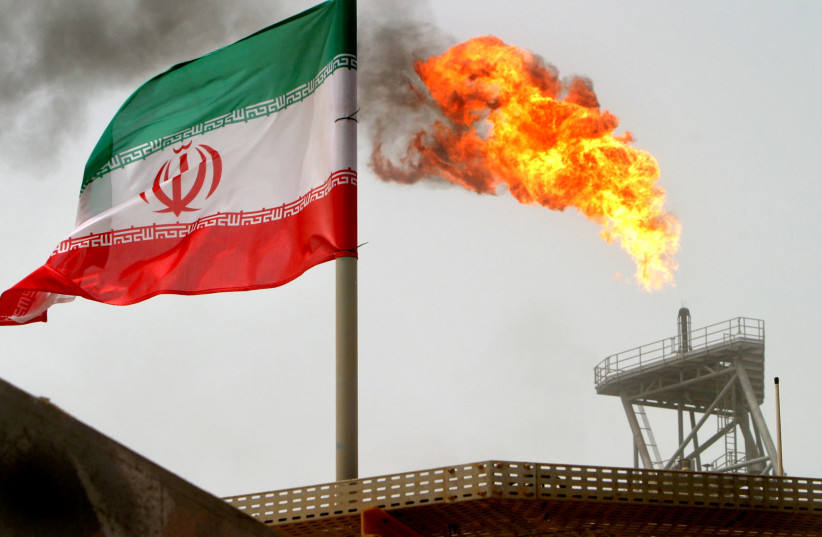 The Washington Post Publishes Op-Ed by J Street Founder That Manipulates Facts as Biden Visits Israel
The Washington Post Publishes Op-Ed by J Street Founder That Manipulates Facts as Biden Visits Israel
Gidon Ben-Zvi
 The former Washington Post building. Photo: Wikimedia Commons.
The former Washington Post building. Photo: Wikimedia Commons.
The arrival of US President Joe Biden in Israel is being used by an ostensibly “pro-Israel, pro-peace advocacy group” as a pretext for accusing the Jewish state of being responsible for the ongoing conflict with the Palestinians.
To readers of The Washington Post’s July 11 opinion piece by Jeremy Ben-Ami, founder and president of J Street, it’s as if the ceaseless Palestinian incitement and chronic rejection of Israeli peace overtures by Hamas and the Palestinian Authority (PA) simply don’t exist.
For example, in the days leading up to last year’s Hamas-initiated conflict that saw thousands of rockets fired from the Gaza Strip at Israeli towns and cities, Palestinian incitement sparked waves of mob violence perpetrated by Muslims at the Al-Aqsa Mosque in Jerusalem during the religious period of Ramadan.
Indeed, there is almost always an uptick in violence during the Muslim holy month, with historical data indicating a 200 percent increase in terrorist attacks around the world.
Apparently, Ben-Ami missed that salient fact.
Meanwhile in Ramallah, the incentivizing of violence against Israelis forms official Palestinian Authority policy. The Palestinian Budget Book states that payments must be made to killed or imprisoned Palestinian terrorists and their families from the Martyrs Fund because the recipients constitute a “fighting sector.”
Notably, the amount paid out increases in proportion to the severity of the crime.
Paying no heed to these grim realities, Ben-Ami doubles down on Israeli culpability:
Over one-tenth of Israel’s Jewish population now lives in occupied territory, governed by different laws and with greater rights than the millions of Palestinians who live next to them in the same territory. The seeming irreversibility of this situation is fueling instability in Palestinian politics and society.
First, there’s the issue of sourcing. The statistic Ben-Ami cites is taken from Al Jazeera, a worldwide media organization endowed by a Qatari government that has a long history of attempting to create an anti-Israel narrative within its coverage of the Jewish state.
More significant is Ben-Ami’s claim that the existence of Jewish communities in the West Bank has led to a “seeming irreversibility” that is “fueling instability in Palestinian politics and society.” He fails to even reference the Israeli government’s repeated good-faith efforts to jump-start the peace process or the Palestinian leadership’s ceaseless intransigence.
The truth is that it has been the PA’s rejection of repeated Israeli attempts to revive peace talks and non-stop incitement to violence that have led to countless rounds of war, as well as the prolonged suffering of the Palestinian people.
Jeremy Ben-Ami is entitled to his opinions. However, The Washington Post, by not checking Ben-Ami’s facts, is allowing its vast readership to be misled by J Street — a group with an evident anti-Israel agenda.
For example, this “pro-Israel, pro-peace advocacy group” came out in favor of Ben & Jerry’s decision last year to boycott Jewish communities in the West Bank. J Street even started a petition to Protect Ben & Jerry’s Right to Oppose the Occupation.
In June, J Street was one of a handful of pro-boycott organizations, including Jewish Voice for Peace and the Council on American Islamic Relations (CAIR), to speak out against a Federal appeals court decision to uphold an Arkansas state law that requires all public contractors to promise they won’t target Israel via Boycott, Divestment, and Sanctions (BDS).
And as recently as July 12, J Street expressed its support for the decision of nine member states of the European Union to continue working with the six Palestinian groups that Israel designated as terrorist organizations in October of last year.
If Jeremy Ben-Ami is serious about addressing the conflict between Israel and “Palestine,” he may want to consider that there is already a clear path to Palestinian self-rule.
The Oslo Accords forged in 1993 between Israel and the Palestine Liberation Organization led to the creation of the Palestinian Authority the following year. The agreement was based on a promise by the Palestinian leadership to renounce terrorism and resolve all outstanding issues with Israel via bilateral negotiations.
To date, the Palestinian leadership has failed to live up to its obligations.
Either way, The Washington Post has a responsibility to get the facts right on a topic as complex and nuanced as the Israeli-Palestinian conflict. As things stand, the paper is effectively normalizing sometimes violent unilateral Palestinian efforts to achieve statehood.
For there to be any chance of restarting peace talks during Joe Biden’s visit to the Middle East, prominent media outlets such as The Washington Post should refrain from uncritically pushing the agendas of known anti-Israel groups and activists.
Zawartość publikowanych artykułów i materiałów nie reprezentuje poglądów ani opinii Reunion’68,
ani też webmastera Blogu Reunion’68, chyba ze jest to wyraźnie zaznaczone.
Twoje uwagi, linki, własne artykuły lub wiadomości prześlij na adres:
webmaster@reunion68.com


 Foto: JAKUB SZYMCZUK\KPRP
Foto: JAKUB SZYMCZUK\KPRP


